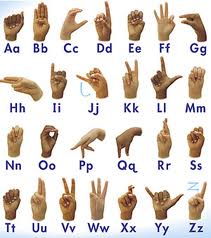Hearing Impaired
People with hearing impairment
There is a wide range of communication preferences and styles among people with hearing loss. Those who have developed deafness later in life do not communicate with sign language, they use English or Hindi or their mother tongue and may communicate through writing and assistive listening devices. People with cochlear implants, like other people with hearing loss, will usually inform you what works best for them.
When the exchange of information is complex—such as during a job interview or doctor’s visit or when reporting a crime—the most effective way to communicate is through a qualified sign language interpreter.
Follow the person’s cues to find out if she prefers sign language, gesturing, writing or speaking. If you have trouble understanding the speech of a person who is deaf or hard of hearing, let her know.
When using a sign-language interpreter, look directly at the person who is deaf, and maintain eye contact to be polite. Talk directly to the person rather than to the interpreter.
People who are deaf need to be included in the decision-making process for issues that affect them; don’t decide for them.
Before speaking to a person who is deaf or hard of hearing, make sure that you get her attention. Depending on the situation, you can extend your arm and wave your hand, tap her on the shoulder or flicker the lights.
Rephrase, rather than repeat, sentences that the person doesn’t understand.
When talking, face the person. A quiet, well-lit room is most conducive to effective communication. If you are in front of the light source—such as a window—with your back to it, the glare may obscure your face and make it difficult for the person who is hard of hearing to speech read.
Speak clearly. Most people who are hard of hearing count on watching people’s lips as they speak to help them understand. Avoid chewing gum, smoking or obscuring your mouth with your hand while speaking.
There is no need to shout at a person who is deaf or hard of hearing. If the person uses a hearing aid your shout will just sound distorted.
People who are deaf (and some who are hard of hearing or have speech disabilities) can make and receive telephone calls with the assistance of a device called a TTY (short for teletypewriter; also called a TDD). If relay services are available they can even order pizza from a pizza parlor, call your store to find out what hours you are open, or make a reservation at your restaurant.


